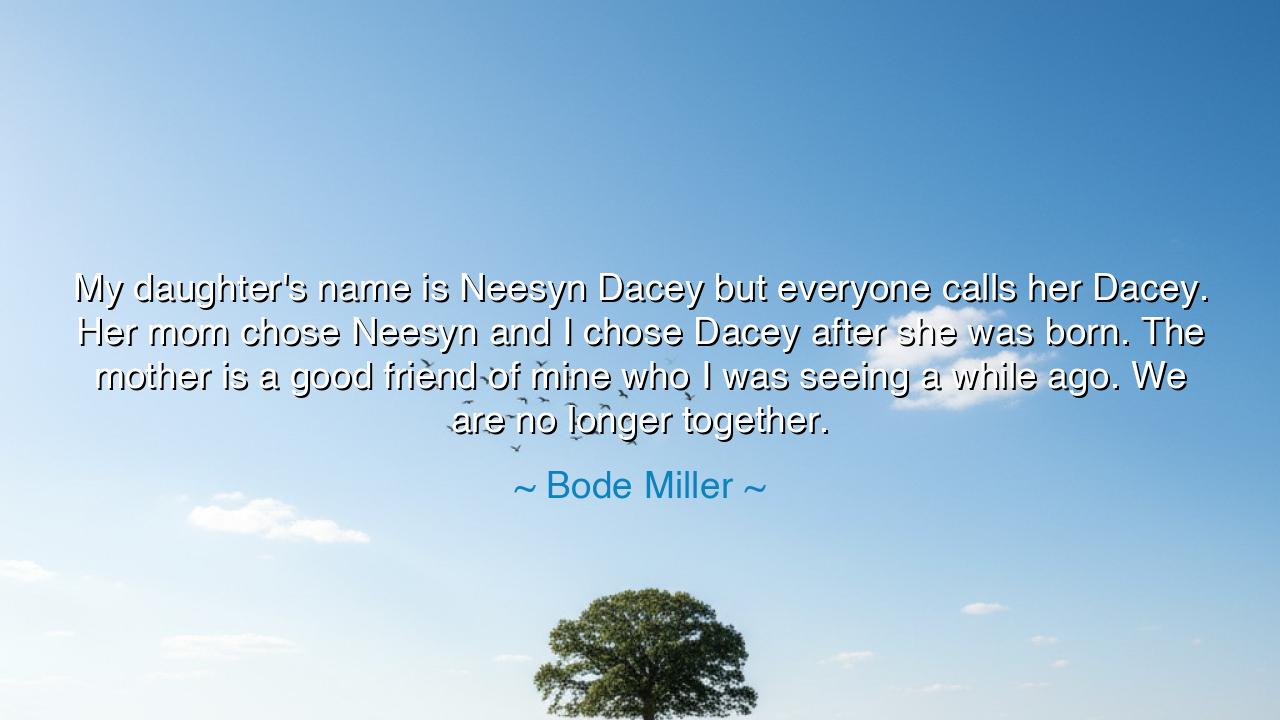
My daughter's name is Neesyn Dacey but everyone calls her Dacey.
My daughter's name is Neesyn Dacey but everyone calls her Dacey. Her mom chose Neesyn and I chose Dacey after she was born. The mother is a good friend of mine who I was seeing a while ago. We are no longer together.






When Bode Miller said, “My daughter’s name is Neesyn Dacey, but everyone calls her Dacey. Her mom chose Neesyn and I chose Dacey after she was born. The mother is a good friend of mine who I was seeing a while ago. We are no longer together,” he spoke words that, though simple and plain, carry the deep resonance of love transformed, loss accepted, and responsibility embraced. In them lies the quiet story of two people who shared a moment of creation — the birth of a child — and who, though their paths have since divided, remain bound by that sacred act. This is not merely a tale of parenthood, but of connection beyond possession, of love that changes shape yet refuses to die.
To the ancients, the naming of a child was a ceremony of profound meaning. A name was not a label, but a destiny spoken aloud, a prayer set free upon the air. Each parent, in choosing a name, offered a piece of their soul — a blessing, a hope, an inheritance of spirit. When Bode Miller and his daughter’s mother each gave her a name, they were both claiming their bond and their responsibility. “Neesyn” and “Dacey” are more than names — they are symbols of shared creation, two threads woven together into the tapestry of one life. Though the parents’ love changed form, their shared devotion remains inscribed in their daughter’s very identity.
This act recalls the ancient story of King Solomon’s judgment, when two women came before him, each claiming to be the mother of a child. When Solomon called for the baby to be divided, the true mother cried out, “Give her the child, but do not kill him!” for her love was selfless. In the same way, Miller’s words reveal a form of love that transcends personal longing. He does not speak with bitterness toward the mother, but with respect — calling her “a good friend,” acknowledging her place in the child’s life. It is a portrait of maturity, of two people who have learned that love is not always possession, and family is not always traditional. The truest measure of a parent is not control, but care.
There is something deeply human in this story — a reminder that life seldom unfolds according to our expectations. The great poet Kahlil Gibran once wrote, “Your children are not your children. They are the sons and daughters of Life’s longing for itself.” In Bode’s reflection, we glimpse this truth. Though he and the mother are “no longer together,” they remain united in their purpose — to protect and nurture their child. The love that once bound them as partners now lives on in a higher form: as shared devotion. In this, Miller’s words transcend his personal story, becoming a reflection of how love evolves, deepens, and matures when guided by compassion.
Yet there is also a quiet sorrow in his tone — the bittersweet awareness of what was and what will never be. Like the tide that retreats from the shore, leaving behind shells of memory, he speaks with tenderness for what remains: his daughter. But in that tenderness, there is also triumph. For he has accepted what many struggle to — that not all relationships are meant to last, yet all can yield something sacred. His daughter is the living testament that even fleeting love can bear eternal fruit. What matters is not the permanence of the bond, but the integrity of the care that follows.
From this, we may draw a lesson as enduring as time itself: Love is not diminished by its ending if it gives life to something good. Whether between parents, friends, or lovers, the mark of true love is what it leaves behind — understanding, growth, or the life of a child. In a world quick to divide, Miller’s words offer a counterexample: that even when unity dissolves, respect can remain; that even when romance fades, responsibility can thrive. The past need not be a wound — it can be a foundation upon which new peace is built.
So, my listener, remember this truth: every bond carries both change and continuity. The love that creates life — in any form — should be honored, even when its shape transforms. Be kind to those with whom you have shared creation, whether of children, dreams, or memories. Let the past live as a blessing, not a burden. For in doing so, you join the lineage of all those who have learned the art of graceful parting and enduring love. And like Bode Miller, you will discover that though hearts may part, their echoes live on — in the laughter of a child, in the peace of understanding, and in the quiet strength of love reborn through wisdom.






AAdministratorAdministrator
Welcome, honored guests. Please leave a comment, we will respond soon